Copyright 2011 by Robert B. Santulli, MD
All rights reserved
Printed in the United States of America
First Edition
For information about permission to reproduce selections from this book, write to Permissions, W. W. Norton & Company, Inc., 500 Fifth Avenue, New York, NY 10110
For information about special discounts for bulk purchases, please contact W. W. Norton Special Sales at or 800-233-4830
Manufacturing by RR Donnelley, Bloomsburg
Book design by Bytheway Publishing Services
Production manager: Leeann Graham
Library of Congress Cataloging-in-Publication Data
Santulli, Robert B.
The Alzheimer's family : helping caregivers cope / Robert B. Santulli.1st ed.
p. ; cm.
A Norton professional book
Includes bibliographical references and index.
ISBN 978-0-393-70577-5 (hardcover)
1. Alzheimer's diseasePatientsCare. 2. Alzheimer's diseasePatientsFamily relationships. 3. CaregiversPsychology. I. Title.
[DNLM: 1. Alzheimer Diseasenursing. 2. Alzheimer Diseasepsychology.
3. Caregiverspsychology. 4. Family Relations. WM 155]
RC523.S275 2011
362.196'831dc22
2011010951
ISBN: 978-0-393-70577-5
W. W. Norton & Company, Inc., 500 Fifth Avenue, New York, N.Y. 10110 www.wwnorton.com
W. W. Norton & Company Ltd., Castle House, 75/76 Wells Street, London W1T 3QT
1 2 3 4 5 6 7 8 9 0
To my family: Linda, Stephen, and Elizabeth
The family is one of nature's masterpieces.
George Santayana
ACKNOWLEDGMENTS
 Many people have been extremely helpful to me in creating this volume. First, I would like to thank Charles (Andy) Anderson, whose generous donation in memory of his wife spawned the creation at Dartmouth of The Jeanne Estee Mackay Anderson Alzheimer's Disease Support and Education Fund. The Anderson Fund has given me the opportunity to focus my work more comprehensively on the needs of the Alzheimer's family. This book is a direct result of that opportunity.
Many people have been extremely helpful to me in creating this volume. First, I would like to thank Charles (Andy) Anderson, whose generous donation in memory of his wife spawned the creation at Dartmouth of The Jeanne Estee Mackay Anderson Alzheimer's Disease Support and Education Fund. The Anderson Fund has given me the opportunity to focus my work more comprehensively on the needs of the Alzheimer's family. This book is a direct result of that opportunity.
I would like to thank Caroline Moore and the rest of her staff at the Dartmouth-Hitchcock Aging Resource Center. They have been wonderful colleagues and aids throughout this process. They have also become an invaluable presence for Alzheimer's families throughout New Hampshire and Vermont.
I would also like to thank Kesstan Blandin, PhD, the Upper Valley Program Coordinator for the Alzheimer's Association of Massachusetts and New Hampshire. Dr. Blandin's intelligence, kindness, and tireless work with Alzheimer's families have been a source of wonderful inspiration and valuable learning for me.
In addition, I wish to thank Erin Onstad, a graduate student at the Dartmouth Institute for Health Policy and Clinical Practice, for her assistance with issues related to Alzheimer's care in the assisted living setting.
I have learned much about Alzheimer's disease from medical texts and scholarly articles, and from conferences, seminars, lectures, and other professional educational resources. But my most valuable learning, by far, has come from the many Alzheimer's individuals and families I have had the privilege of knowing over the past four decades. I have cared for many of these in my clinical practice; others have attended the various Alzheimer's support groups I have facilitated. We have struggled together with the many difficult issues that arise in this terrible disease. Mere words cannot convey how thankful I am to those Alzheimer's families who taught me so muchnot only about the disease and its impact on families, but about the enormous strength of the human spirit in the face of terrible adversity.
I would also like to thank Andrea Costella Dawson, Vani Kannan, Karen Fisher, and the rest of the editorial staff at Norton who helped get my ideas into an organized, readable, and hopefully useful format. In particular, Andrea Costella Dawson's wisdom and intelligence have been outstanding, surpassed only by her patience and tolerance when, all too often, other professional activities pushed this work to the side.
Finally, there were many weekends when my involvement with The Alzheimer's Family competed with my involvement with my own family. I want to thank them, again, for their forbearance. We are all glad for the completion of this volume. I do hope it will be interesting, informative and useful. Although I have emphasized how many different people have been helpful along the way, I am solely responsible for any errors of commission or omission.
INTRODUCTION
ALZHEIMER'S: THE DISEASE OF THE 21ST CENTURY
 A generation ago, cancer was looked upon with great fear, as an incurable death sentence. People talked about it in hushed tones, afraid to utter the C word because of the extreme reactions it produced. While cancer is still dreaded, there has been much progress in its treatment, and some forms of cancer are now seen as a chronic illness to be managed. Along with significant advances in care, the stigma associated with the disease has declined, and the condition is much more openly discussed in the public arena.
A generation ago, cancer was looked upon with great fear, as an incurable death sentence. People talked about it in hushed tones, afraid to utter the C word because of the extreme reactions it produced. While cancer is still dreaded, there has been much progress in its treatment, and some forms of cancer are now seen as a chronic illness to be managed. Along with significant advances in care, the stigma associated with the disease has declined, and the condition is much more openly discussed in the public arena.
In the 1980s, AIDS began to replace cancer as the most feared disease in the minds of many. To a great degree, this had to do with the lack of effective treatments initially, and it wasaccuratelyseen as inevitably fatal. AIDS (like most cancers, certainly) remains an extremely serious condition, of course, but as effective treatments have been developed, some of the extreme fears of the disease and the stigma associated with it have begun to lessen.
Now, it would appear that Alzheimer's disease is becoming the illness that peopleparticularly those at or beyond middle age fear the most.
Although Alzheimer's disease can occur earlier in life, it is primarily a disease of the aged. Overall, about 13% of persons over age 65 have Alzheimer's disease. At age 65, however, only about 2% suffer from the illness. However, every 5 years, the percentage of persons with the disease doubles, so that by 70, nearly 5% have it; at 75, about 10% of the population, and at 80, at least 20%. By 85, some 40% of those still living meet criteria for Alzheimer's disease (Alzheimer's Association, 2011).
Males and females seem to be affected at approximately the same rate, but since a greater number of older females are alive than males, more women than men are living with the disease. According to The Shriver Report: A Woman's Nation Takes on Alzheimer's (2010) about two thirds of people with Alzheimer's disease are women. And women comprise about 60% of the care-givers.
Alzheimer's disease is a type of dementia (about which more later); it is the most common cause of dementia by far. According to some studies, Alzheimer's disease, by itself or in combination with another form of dementia, accounts for as much as 75% of all cases of dementing illness. However, other forms of dementia often present very similar issues to the family, in terms of the nature of symptoms and the effects on the caregiver. In many ways, from the caregiver's perspective, there may be more similarities than differences among the different forms of dementia. Thus, while this book primarily concerns the Alzheimer's family, much of the content is also relevant to family members of people with other types of dementia. Other common dementias include the following:
Vascular dementia
Mixed dementia
Dementia with Lewy bodies
Dementia of Parkinson's disease
Frontotemporal dementia
For simplicity's sake, and because it covers the vast majority of persons with dementia, the primary caregiver and other family members of the patient are referred to as the Alzheimer's family, but in many cases the phrase the dementia family might be an appropriate substitute.

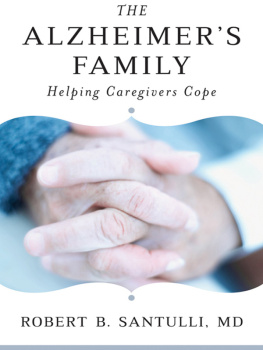
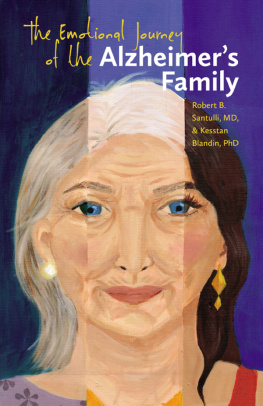
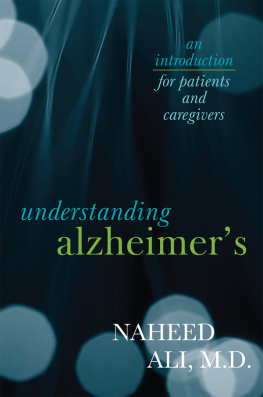

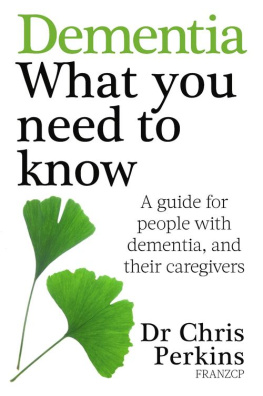
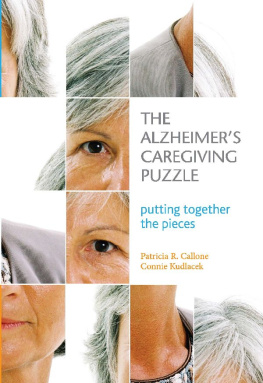
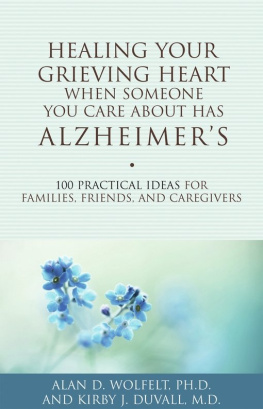
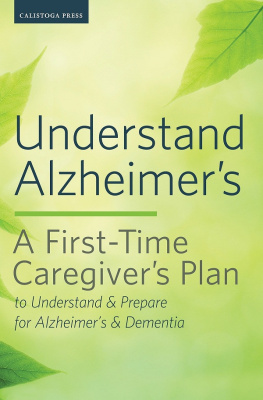
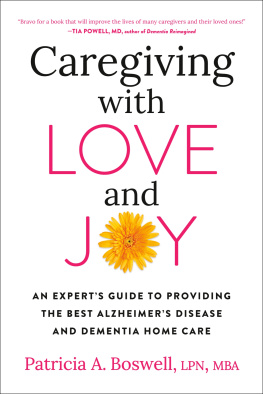
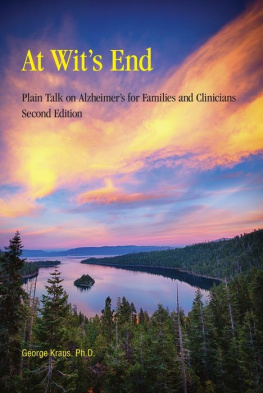
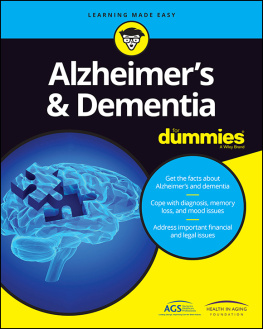

 Many people have been extremely helpful to me in creating this volume. First, I would like to thank Charles (Andy) Anderson, whose generous donation in memory of his wife spawned the creation at Dartmouth of The Jeanne Estee Mackay Anderson Alzheimer's Disease Support and Education Fund. The Anderson Fund has given me the opportunity to focus my work more comprehensively on the needs of the Alzheimer's family. This book is a direct result of that opportunity.
Many people have been extremely helpful to me in creating this volume. First, I would like to thank Charles (Andy) Anderson, whose generous donation in memory of his wife spawned the creation at Dartmouth of The Jeanne Estee Mackay Anderson Alzheimer's Disease Support and Education Fund. The Anderson Fund has given me the opportunity to focus my work more comprehensively on the needs of the Alzheimer's family. This book is a direct result of that opportunity.